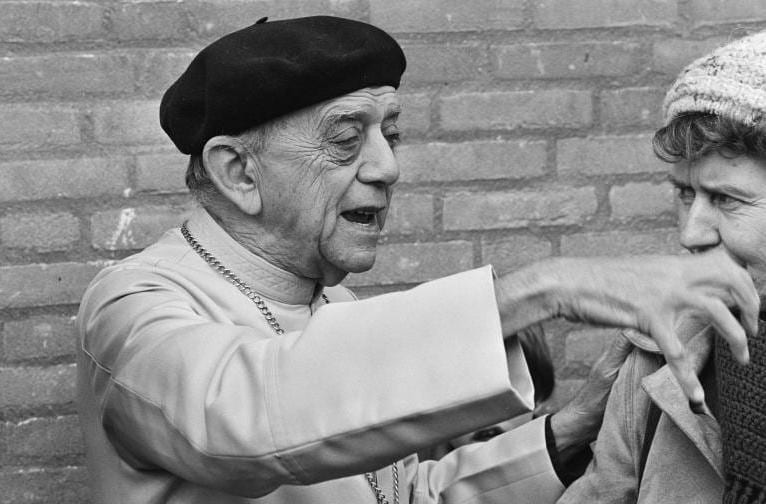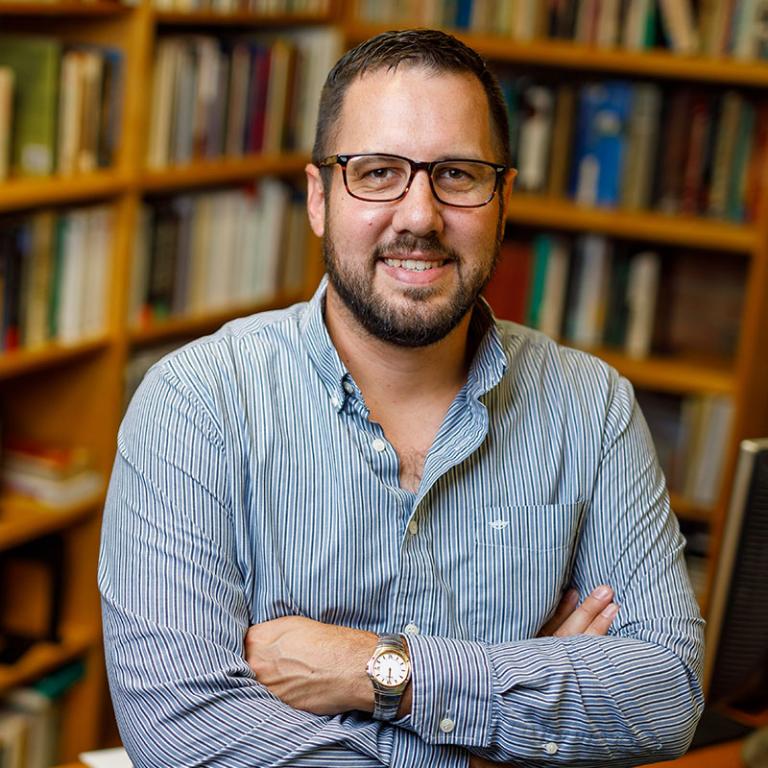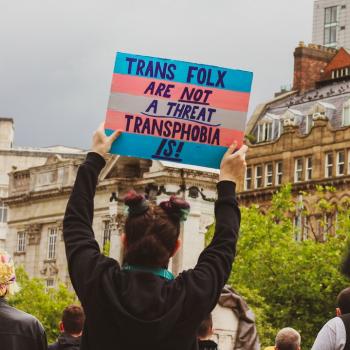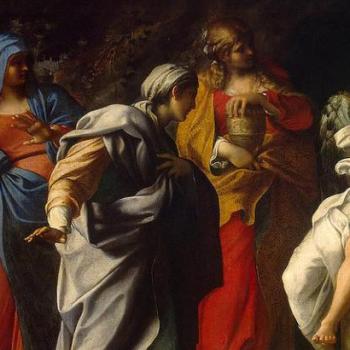On November 1, the church celebrates All Saints’ Day, also known as All Hallows’ Day or Hallowmas. For many of us, this holiday has been overshadowed by the day that precedes it: Halloween, or All Hallows Evening, the evening before All Saints’ Day.
Some traditions, such as Roman Catholicism, have a process called canonization for recognizing their holy people as saints. These are people who devoted their lives to the work of the gospel—including recently people like Mother Teresa and Pope John Paul II. For the Roman Catholic Church, the first step toward sainthood is called “beatification,” or making blessed. A saint, then, is one whose life is marked by the Beatitudes, the blessings that Jesus declares in his Sermon on the Mount (Matthew 5:1–12).

According to Matthew’s Gospel, the Sermon on the Mount is the first major sermon Jesus preached after “announcing the Good News about the Kingdom” (Matthew 4:23). The Sermon on the Mount, then, can be read as the Constitution for the Kingdom of God.
Which would make the Beatitudes the preamble.
In my tradition—Anabaptism—there isn’t this same focus on identifying particular saints. But there is an emphasis on living holy lives, lives of sanctification or saintliness. As we seek to live holy lives, to be faithful citizens of God’s Kingdom in the context of our own communities and societies, there’s no better place to start than with the Beatitudes.
Recently I received a question from a congregant about the election, which I’ll quote here with permission:
Does God compel us to vote? Christians of all political strides make the case that we should vote for a certain politician because of their position on this or that particular topic. While God is not silent on injustices in this world, does this mean God actually compels us to vote in order to address injustices? To put it a different way, shouldn’t Christians be separate from the world’s political processes and conscientious objectors to voting, but also speak prophetically to injustices in this world?
This is an important question, and it’s one I’ve thought about a lot as I’ve studied theology and the Bible as an adult.
The short answer is no, there is no place in Scripture where God compels disciples to vote. And for many years of my adult life, I took the perspective implied in the question—namely, that Christians should “speak prophetically to injustices in this world” but “be separate from the world’s political processes.”
There’s a long history within the Anabaptist tradition, in particular, for this very approach. The Schleitheim Confession written by Anabaptists in 1527 during the early years of the radical reformation represents this perspective.
It states, “For truly all creatures are in but two classes, good and bad, believing and unbelieving, darkness and light, the world and those who [have come] out of the world, God’s temple and idols, Christ and Belial; and none can have part with the other.”
It thus states that disciples of Jesus are to “withdraw from Babylon and the earthly Egypt that we may not be partakers of the pain and suffering which the Lord will bring upon them.”
This includes all involvement in “civic affairs.”
But while I still agree with the Bible’s and the Anabaptists’ warnings against giving our allegiance to civil authorities, the question is whether that is what we’re doing when we vote or otherwise participate in democratic processes.
The reality is that neither the Bible nor the Schleitheim Confession was written in the context of a participatory democracy. The Bible doesn’t speak directly to voting, then, because voting simply wasn’t a live option for its original readers. We might as well ask whether God compels us in Scripture to support space exploration or molecular biology.
Since these weren’t questions that could have possibly been on the minds of the biblical authors, we shouldn’t expect them to address them. But that doesn’t mean that the Bible offers us no guidance.
And here is where I want to turn our attention back to the Beatitudes. If Jesus is here describing what the life of the disciple or saint or faithful citizen entails, we would do well to draw guidance from this passage, which we can apply to our own time and context.
When we look at the Beatitudes, we see that the question is not so much whether to vote or how to vote. Rather, it is whether we hunger and thirst for justice. It is whether we are people who show mercy, whose hearts are pure, who work for peace, who aren’t afraid to be persecuted for seeking justice.
When we ask the question that way, it leads to another set of considerations: What does it look like for Christians to seek justice, mercy, and peace in our own time and context?
At Keller Park Church, our mission is “to seek the peace of the neighborhood by sharing God’s love with our neighbors.” The question is how we can best seek the peace of our neighborhood and share God’s love with our neighbors.
Here we can turn to the first three Beatitudes, where Jesus says those who are poor, those who mourn, and those who are humble are blessed.
But how, exactly, are they blessed?
It doesn’t seem that they are blessed because of their current conditions. Rather, Jesus suggests that they are blessed because their conditions are being reversed. Indeed, in the Gospel of Luke’s version of the Beatitudes, this reversal is made explicit. There Jesus not only blesses those who are poor, hungry, weeping and persecuted now. He also pronounces woes on those who are rich, prosperous, laughing, and praised by the crowds now (Luke 6:20–26).
As we hunger and thirst for justice, as we seek to be faithful citizens, as we seek the peace of our neighborhood, we are called by Jesus to take sides.
This doesn’t mean that we are called to join a particular political party. Rather, it means aligning ourselves with the cause of those who are poor, those who are mourning, those who are humiliated, those who are persecuted.
It’s true that there are many ways to do this. We do this week in and week out through our ministries of the church, when we literally give food to those who are hungry. But we also do this when we seek to dismantle systems, structures, and policies that cause poverty and hunger in our neighborhood. This, too, is the work of the church and the role of the faithful citizen.
The mid-twentieth-century Brazilian archbishop Hélder Câmara spent his life advocating for the poor and for human rights in the midst of an oppressive, military dictatorship in his country. Because of his advocacy, he was silenced by the government, who blacklisted him from making radio or television appearances in his country. This caused him to become an international figure, as he traveled to other countries to advocate for his people.
He is known to have said, “When I give food to the poor, they call me a saint. When I ask why they are poor, they call me a communist.”
And so it is with the church in our time and place. When we distribute food boxes and hot meals on Tuesdays and Saturdays, we receive praise and financial donations from churches and individuals far and wide. But when we advocate on behalf of our neighbors who are struggling with unjust systems and policies, we’re chastised for being too “political.”
But the reality is that these are two sides of the same coin. As New Testament scholar Raj Nadella observes, the word usually translated as “comforted” in the second Beatitude is derived from the Greek word “paraclete.” This is the word Jesus uses to describe the Holy Spirit in John 14. Jesus there says, “If you love me, obey my commandments. And I will ask the Father, and he will give you another Paraclete, who will never leave you, the Holy Spirit, who leads into all truth” (John 14:15–17).
Many Bible translations translate the word “Paraclete” as “Comforter,” which is one possible meaning of the word. But the New Living Translation and others choose instead to translate it as “Advocate,” which is another possible meaning of the word.
As Nadella notes, “the Greek word paraclete . . . was used in courtroom settings in the first century Greco-Roman context. It referred to lawyers and advocates and has the connotation of interceding on behalf of those who need assistance.”
And so, when we return to the Beatitudes, Jesus is saying that those who mourn are blessed not just because they will be comforted. They are blessed because they will be advocated for.
Nadella writes,
Comfort and consolation are helpful and even essential but not nearly sufficient. Merely comforting individuals and communities who are mourning due to hunger, violence and injustice might address the symptoms of their situation but does little to change the roots of their suffering. As followers of Jesus, we are called to advocate on behalf of the oppressed and do everything in our capacity to reverse their current situation. When we see people weeping because of hunger, police brutality or gun violence, our response cannot be limited to thoughts and prayers. As important as thoughts and prayers are, they must be followed by concrete actions.
One of those concrete actions might well be to vote, not because God compels us to or because Christian discipleship requires it or because we give our allegiance to governmental authorities. Rather, it is because it just might be one small act of advocacy on behalf of those who are poor and those who mourn.
But there is so much more we can do as we seek to be faithful citizens. Rather than pretending like we don’t already have power and privilege, we can seek ways to use the power and privilege we have to advocate for the oppressed. Different Christians will find different ways to do this, and it’s something that we can discern together as a community how best to do. But ultimately we are blessed not by removing ourselves from the world and its troubles but by entering into it and seeking its shalom.












